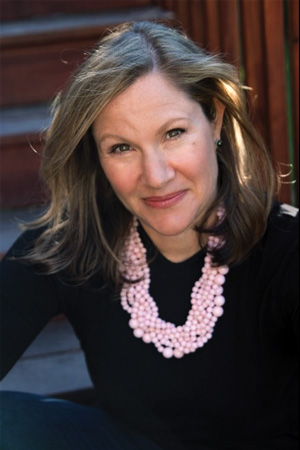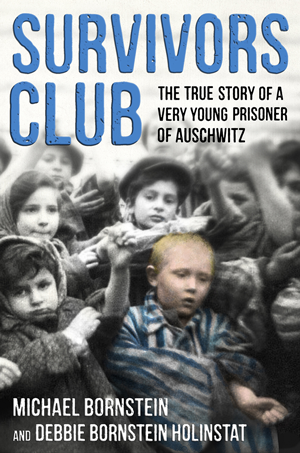Debbie Bornstein Holinstat on Holocaust "Survivors Club"

Photo courtesy of FSG Books for
Young Readers
See SLJ‘s review of Survivors Club
A little over a year ago, Debbie Bornstein Holinstat sat down with her father, Michael Bornstein, determined to chronicle the incredible story of his experiences living in Nazi-occupied Poland and surviving the Holocaust as a young child. The result: Survivors Club: The True Story of a Very Young Prisoner of Auschwitz (Farrar; Gr 6-8). SLJ chatted with Holinstat about her book, an SLJ January Popular Pick, and what students can gain from learning about the Holocaust.
How did this book come together? I have wanted to help my dad [coauthor Michael Bornstein] write down his story for as long as I can remember. He always resisted talking about the Holocaust, though. He preferred to let survivors older than him, who remembered more details, carry the burden. Those survivors are passing on, and my dad has suddenly become acutely aware that he is left with this huge responsibility to ensure [that] the next generation understands the atrocities of the Holocaust—and never forgets.
I think being a grandfather to 11 grandchildren made the responsibility all the more real. His kids and grandchildren pushed and pressed and finally convinced him to talk.
The final push, though, came as we learned new information about his survival, via several Holocaust museums. We didn’t know how he managed to survive for half a year inside a death camp (Auschwitz) where the average lifespan of a child was just two weeks. When old paperwork was shared with us, the importance of telling his story suddenly seemed undeniable.
 What was it like researching your family history? As a TV news producer for MSNBC, I’m accustomed to researching people’s backgrounds, but digging up information on your own family history is a whole different ball game. We [listened] to old audio recordings and videotaped testimony. We were [also] granted access to a private diary written by one survivor who knew my dad and his family well. My mother and sister worked tirelessly to help research, and I spent weeks interviewing relatives and family friends. How can I describe what it felt like to tell my own dad that I had learned his father was a true hero who courageously saved dozens, if not hundreds, of lives?
What was it like researching your family history? As a TV news producer for MSNBC, I’m accustomed to researching people’s backgrounds, but digging up information on your own family history is a whole different ball game. We [listened] to old audio recordings and videotaped testimony. We were [also] granted access to a private diary written by one survivor who knew my dad and his family well. My mother and sister worked tirelessly to help research, and I spent weeks interviewing relatives and family friends. How can I describe what it felt like to tell my own dad that I had learned his father was a true hero who courageously saved dozens, if not hundreds, of lives?
RELATED
The job outlook in 2030: Librarians will be in demand
The job outlook in 2030: Librarians will be in demand
ALREADY A SUBSCRIBER? LOG IN
We are currently offering this content for free. Sign up now to activate your personal profile, where you can save articles for future viewing






Add Comment :-
Comment Policy:
Comment should not be empty !!!
Stanley Yokell
I lived in North Caldwell for many years. My three children graduated from West Essex. The name Michael Bornstein is familiar to me. But I don't know when he came to North Caldwell or how long he lived there. Shen I was a boy growing up in Brooklyn, my beloved parents helped escapees from the holocaust who were fortunate to be admitted to the U.S, despite the high level of anti-Semitism and the burying of the facts in the back of respectable newspapers like the New York Times, the marching of bundists in New Jersey and in the Yorkville section of New York. One of my best friends, Frank Mittelberger, a first rate Mechanical Engineer and is brother succeeded in coming to the U.S. As I approach my 95th birthday, I so my best to pass on the bitter history of Hitler's rise to power and the destruction of Jewish life in Europe that he and his kind caused. I alos pass on as much as I can about Stalin and the soviet anti-Semitism as I can; I intend to buy the book and appreciate your having written it.Posted : Feb 25, 2017 03:18